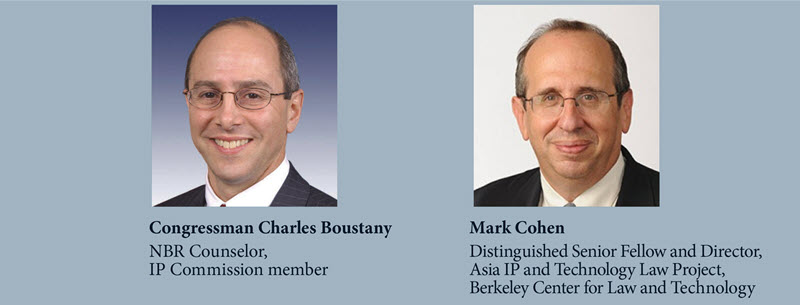Contact
Intellectual Property in U.S.-China Relations
Developments in China’s IP Regime, the Trade War, and Anti-Suit Injunctions
On October 18, 2021, the National Bureau of Asian Research (NBR) convened a bipartisan informational briefing for Congressional staff on U.S.-China intellectual property (IP) relations. Experts discussed developments in China’s IP regime, with an emphasis on changes in IP case outcomes during the U.S.-China trade war, China’s IP commitments in the Phase One Agreement, and the recent increase in the use of anti-suit injunctions by Chinese courts in IP cases.
In the accelerating competition for leadership in emerging technologies, intellectual property has become central to defensive policy measures such as export controls and foreign investment screening, as well as proactive investments in research & development. IP considerations in domestic law and international agreements increasingly affect international business operations, supply chains, trade agreements, and developments in the global digital economy. Panelists concluded with policy recommendations for Congress in this area of growing importance for U.S. economic security in an era of U.S.-China strategic competition.
Participants
Panelists
Congressman Charles W. Boustany Jr., Counselor, The National Bureau of Asian Research
Mark Cohen, Director and Senior Fellow, Berkeley Center for Law and Technology, University of California at Berkeley
Moderator
Joshua Nezam, Director of Congressional Affairs, The National Bureau of Asian Research

Speaker Bios
Congressman Charles W. Boustany Jr., MD, is a Counselor at NBR. Congressman Boustany retired from the U.S. Congress after serving from 2005 to 2017. He represented Louisiana’s 7th Congressional District, which later became Louisiana’s 3rd Congressional District after reapportionment. During his tenure, he served on the House Ways and Means Committee and chaired the Subcommittee on Oversight, the Subcommittee on Human Resources, and the Subcommittee on Tax Policy. He was also a senior member of the Subcommittee on Trade.
Congressman Boustany was an acknowledged leader in the areas of trade policy, international tax policy, energy policy, and foreign policy in the U.S. House of Representatives. He co-chaired the U.S.-China Working Group, the U.S.-Japan Caucus, and the Friends of TPP Caucus. Congressman Boustany was a very early promoter of U.S. exports of liquefied natural gas and crude oil.
Mark Cohen heads the Asia IP Project at the Berkeley Center for Law and Technology at Berkeley Law School. Previously, Cohen was Senior Counsel, China in the Office of Policy and International Affairs at the U.S. Patent and Trademark Office, after serving as a visiting professor at Fordham Law School (2011-2012). Prior to that time, he served in such functions as: Director, International Intellectual Property at Microsoft Corporation; Of Counsel to Jones Day’s Beijing office; and Senior Intellectual Property Attaché at the U.S. Embassy in Beijing (2004- 2008). Cohen was the first IPR Attaché posted by USPTO to handle IPR issues in a foreign country and he was the recipient of the US Chamber of Commerce’s “IP Champion” award in 2014. In total, he has over 30 years private, public sector, in-house and academic experience in China and transition economies, with a focus on technology trade and intellectual property.
Joshua Nezam is Director of Congressional Affairs at NBR. Mr. Nezam serves as the connection between NBR and the United States Congress, working with NBR’s research teams and NBR’s executive team to develop research agendas and outreach strategies that inform Congressional debate and action. Prior to joining NBR, Mr. Nezam served as the national security fellow for Senator Cory Gardner, former chairman of the Senate Foreign Relations Subcommittee on Asia and the Pacific. He also conducted policy research on North Korean nuclear strategy as a James A. Kelly fellow with Pacific Forum, consulted for the National Geospatial-intelligence Agency on Korean Peninsula issues, worked on the House Foreign Affairs Subcommittee on Asia and the Pacific, and served at the political section of the U.S. Embassy in Seoul. He received an MA in International Studies from Korea University in Seoul, an MA in International Service from American University in Washington, D.C., and a BA in Philosophy from the University of Missouri-Columbia.



